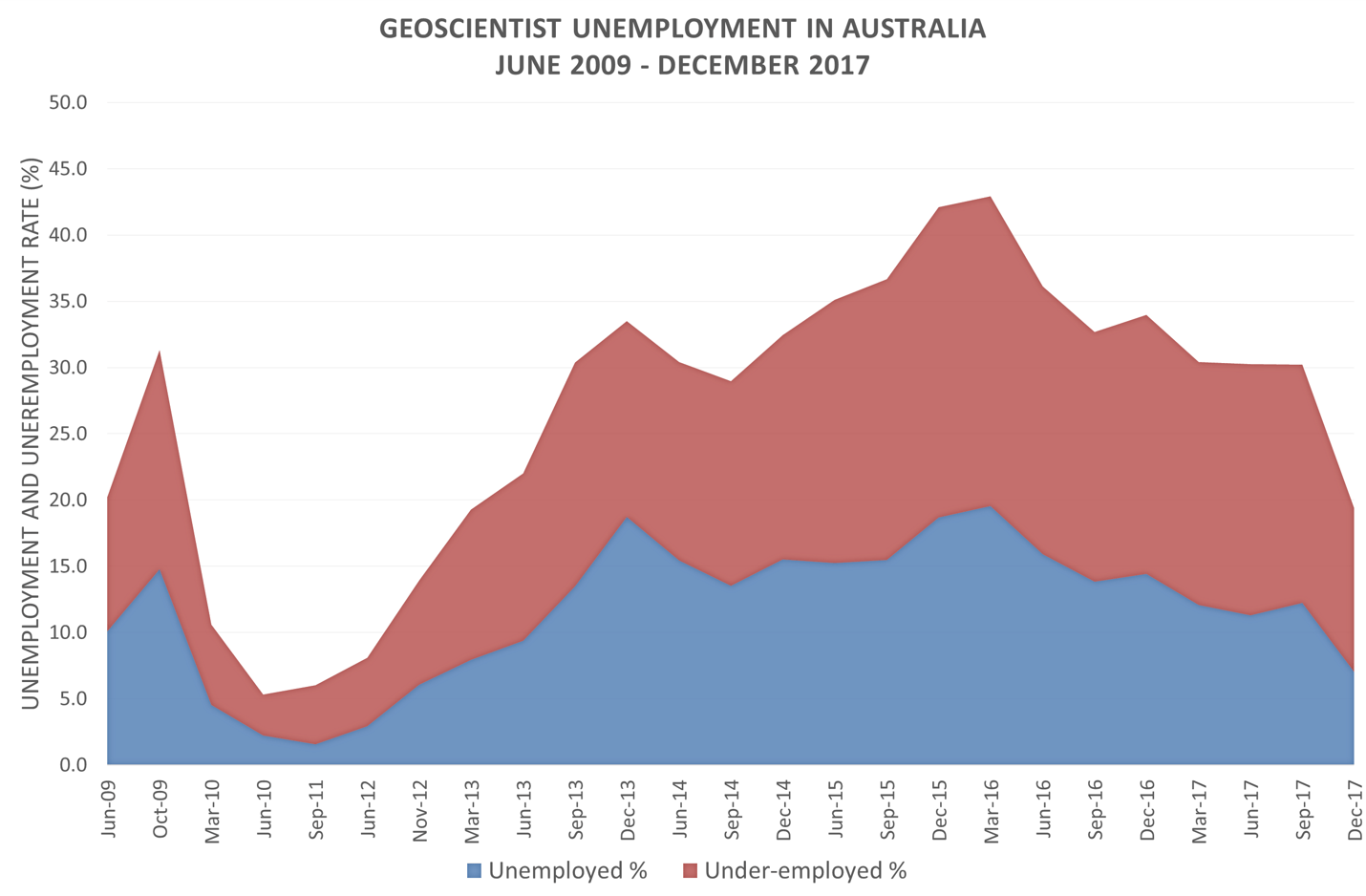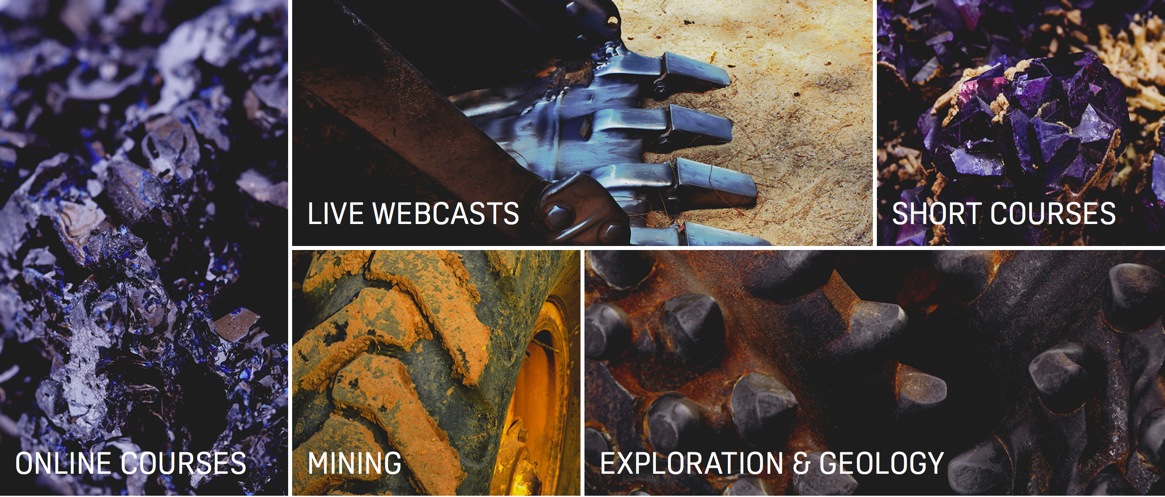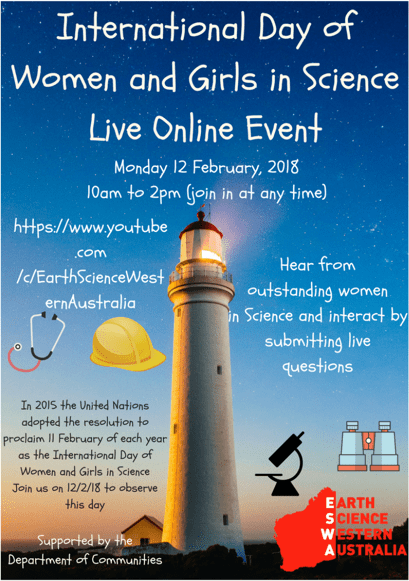Signs of light at the end of the unemployment tunnel?
The latest AIG Australian Geoscientist Employment Survey results for Q4 2017, reviewed today, show that geoscientist unemployment in Australia fell dramatically from 12.2% in Q3 2017 to 7.0% at the end of Q4.
Underemployment also fell from 18.0% to 12.3% in final three months of last year.
The unemployment rate is the lowest recorded since Q3 2012 and combined rate is the lowest since March 2013.

A more complete analysis of the survey results is being prepared. Watch this site for details.
19 Feb 2018

The Economic Geology Research Centre (EGRU) at James Cook University (JCU) is looking for a PhD student available to start immediately to work on a project researching the magmatic evolution and magma fertility for Cu-Au-REE mineralization of the Mary Kathleen Domain, Mount Isa Inlier.
This projects is part of a larger research effort that we are conducting together with the Geological Survey of Queensland (GSQ) to improve the exploration potential in the Mount Isa region. As part of this project you will work with EGRU researchers, GSQ staff and exploration geologists from various mining companies operating in the region. This is a unique opportunity to advance your research career and learn new skills as part of a world class research team.
This project will benefit from recently rejuvenated analytical facilities at the Advanced Analytical Centre at JCU, and will include: micro-imaging, whole rock and in-situ major and trace element geochemistry; U-Pb dating of zircon, (± titanite, apatite, monazite); Hf isotopes in zircon; Nd isotopes in apatite, titanite & REE minerals; whole rock radiogenic isotopes, etc.
The successful applicant will make extensive use of these facilities and contribute to developing new research methods. We are looking for a candidate who has field geology and laboratory experience with at least one of the above techniques and who is willing to contribute to the research effort within EGRU. A first class Honours or a Masters by research are essential to be eligible for PhD studies at JCU. International applicants are encouraged to apply, but preference will be given to Australian and New Zealand citizens or permanent residents.
If you are interested in being part of our team and would like more information about this project please contact one of the project leaders:
Prof. Paul Dirks (paul.dirks@jcu.edu.au)
Assoc. Prof. Carl Spandler (carl.spandler@jcu.edu.au)
Dr. Ioan Sanislav (ioan.sanislav@jcu.edu.au)
More information about the Geoscience department and EGRU can be found here.

Edumine offers more than 200, high quality courses spanning varied aspects of geology, exploration and mining, that have been used by professional geoscientists on five continents to build their capabilities and advance their careers.
Courses are offered in several formats, including self-paced on-line study, live webcasts and face to face short courses. Some courses may be used as credit towards a Certificate in Mining Studies qualification from:
All courses are accredited by the International Association of Continuing Education and Training.
Have you developed a short course for geoscientists? Consider partnering with Edumine to maximise the value and exposure of your work. Contact Edumine for details.
AIG members can access the campus by enrolling via the AIG membership portal link on the website home page. AIG is proud to be able to offer members a dedicated Edumine campus, in common with a number of leading professional associations, companies and mines globally.

The American Geosciences Institute (AGI) has announced that the theme of Earth Science Week 2018 will be “Earth as Inspiration.” The coming year’s event will emphasize artistic expression as a unique, powerful opportunity for geoscience education and understanding in the 21st century.
Earth Science Week 2018 learning resources and activities will engage young people and others in exploring the relationship between the arts and Earth systems. The coming year’s theme will promote public understanding and stewardship of the planet, especially in terms of the ways art relates to geoscience principles and issues as diverse as energy, climate change, the environment, natural disasters, technology, industry, agriculture, recreation, and the economy.
“A longtime provider of top-quality curricula and teacher training, AGI supports the Next Generation Science Standards, which emphasize what is known as three-dimensional teaching, including introducing students to ‘cross-cutting concepts’ that help students see connections across the sciences,” says Geoff Camphire, AGI’s Manager of Outreach. “Through instruction based on these standards, students can find ways to combine the arts, sciences, and other subjects. Such educational strategies find a welcome environment in schools nationwide, where STEAM (Science, Technology, Engineering, Arts, and Mathematics) has become an organizing principle of cross-curricular cooperation among educators and students.”
Creativity, problem-solving, and critical-thinking skills are as important to the arts as they are to the Earth sciences. Consider an artist making silk screen prints, for example. The artist thinks in terms of layers added in a specific sequence. This process relies on similar thinking skills to those used by scientists interpreting geological samples, such as cores, trackways, and rock strata. Professional geoscientists themselves innovatively combine sciences such as chemistry, physics, and biology to understand the interactions of Earth systems including the geosphere (earth), hydrosphere (water), atmosphere (air), and biosphere (living things). People of all ages are invited during Earth Science Week 2018 to join in this creative endeavor.
Reaching over 50 million people annually, AGI leads Earth Science Week in cooperation with its sponsors and the geoscience community as a service to the public. Each October, community groups, educators, and interested citizens organize celebratory events. Earth Science Week offers opportunities to discover the Earth sciences and engage in responsible stewardship of the Earth.
Earth Science Week is supported by many organisations. Australian involvement in Earth Sciences Week is coordinated by Geoscience Australia.
The American Geosciences Institute (AGI) received a great response to their recent Tracking the Global Supply of Critical Materials webinar which was co-sponsored by AIG. A total of 754 registrants and 400 live attendees from 48 countries participated in the event.
Recordings of the talks and Q&A session, along with copies of the speakers’ slides and additional resources, are now available on the AGI website.
ESWA, Earth Sciences Western Australia, is holding a live, on-line event Monday 12 February to celebrate the International Day of Women and Girls in Science.

The event will be streamed live on ESWA’s YouTube channel between 10:00 am and 2:00 pm Perth time (GMT+8:00) and will be recorded for viewing later if you can’t join the live stream.
Hear from outstanding women in Science and interact by submitting live questions.
Suitable for girls and boys, women and men of all ages. Pitched at girls and boys in upper primary and lower secondary school.
Click here for the event schedule and speaker details.
This is a great opportunity for anyone to hear from a great selection of speakers on science career options for young people, not just in Western Australia.